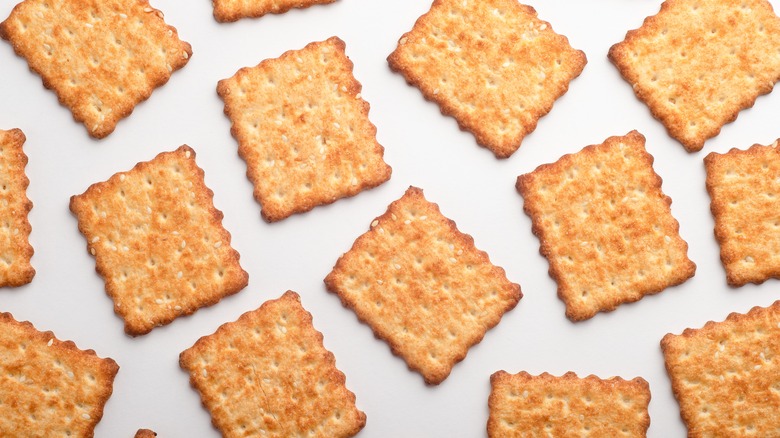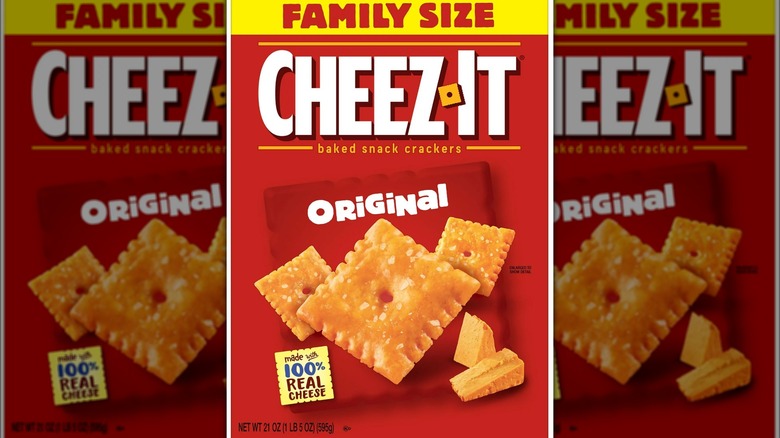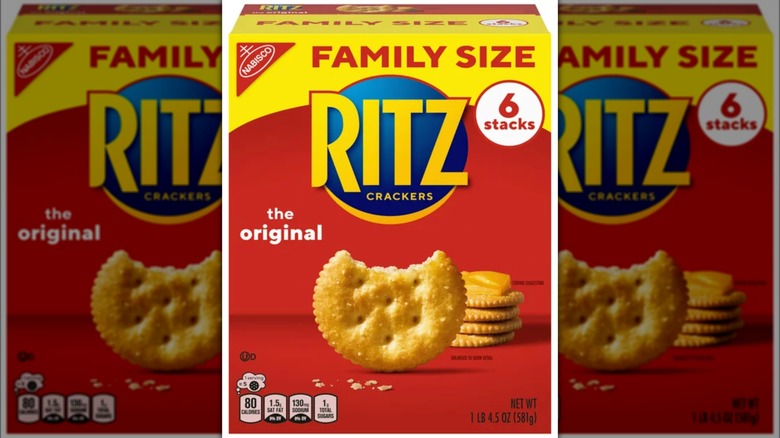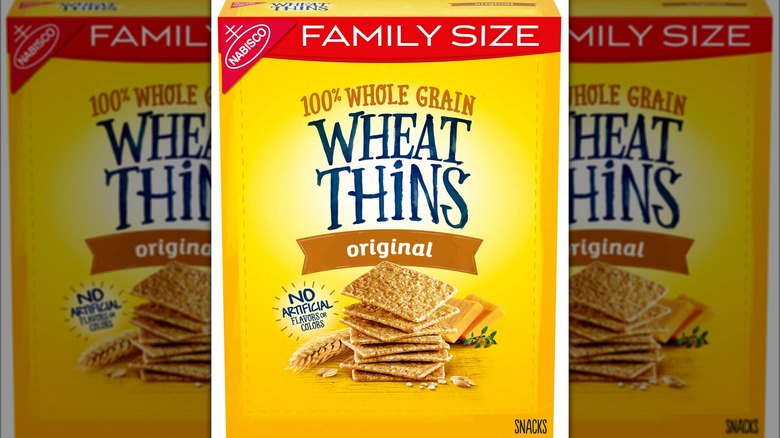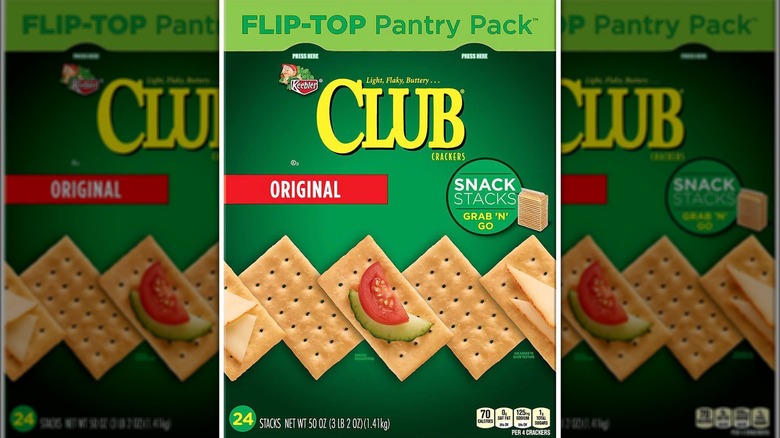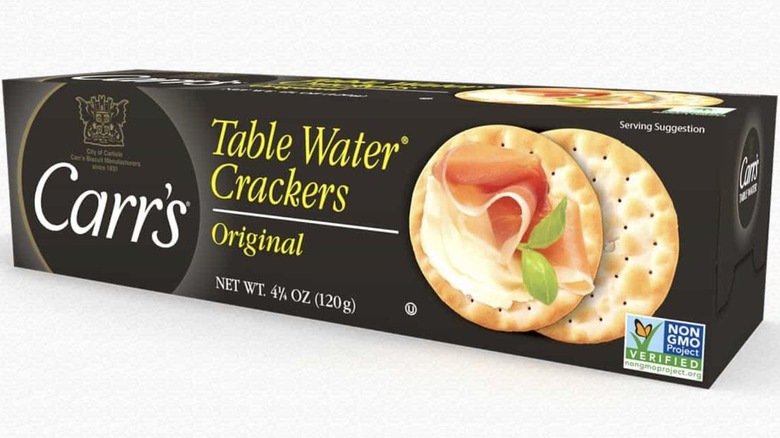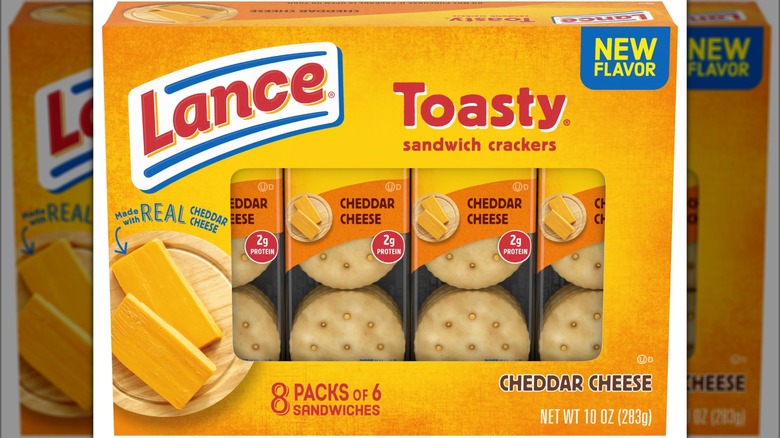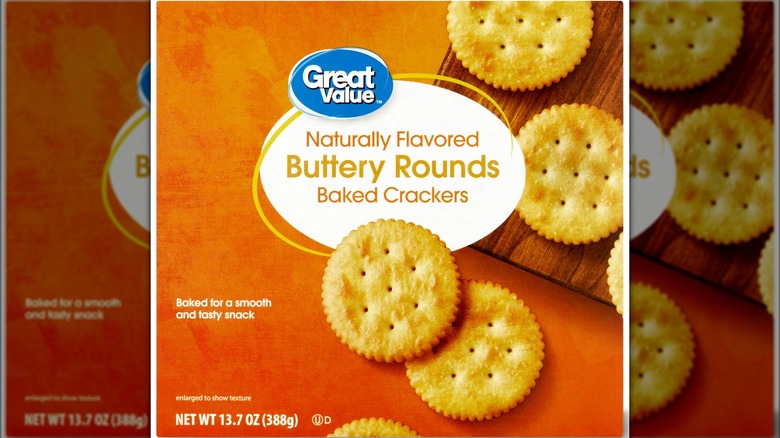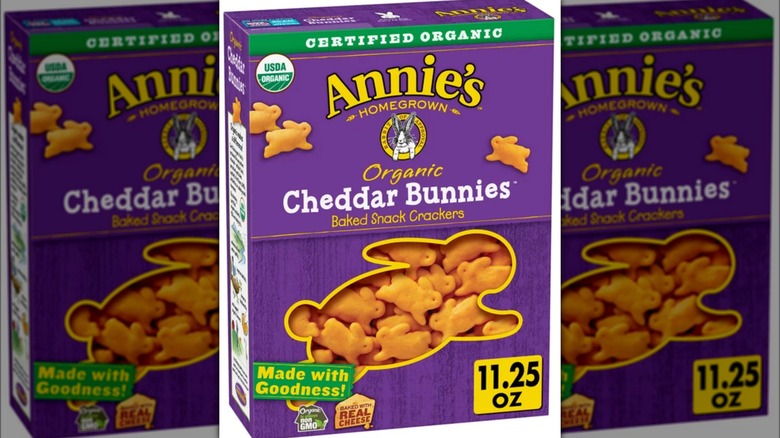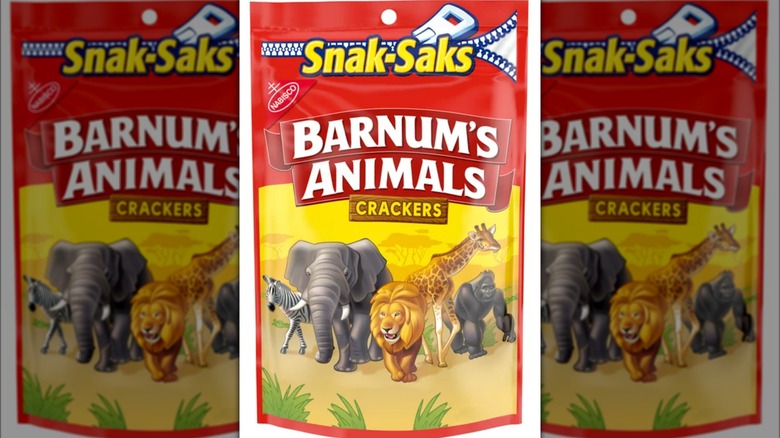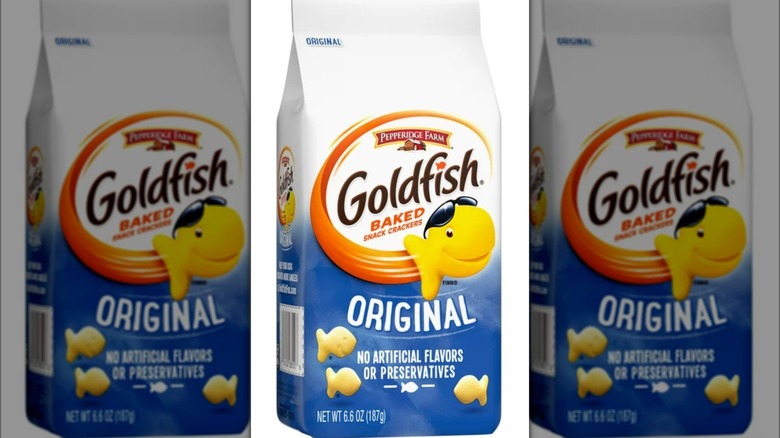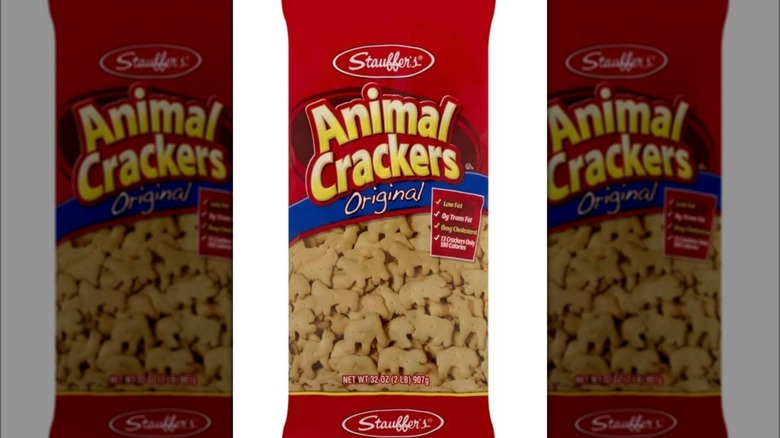14 Of The Unhealthiest Store-Bought Crackers
There are some foods you just have to have on hand, and crackers are one of them. The humble cracker has been a store-cupboard staple for hundreds of years and was originally invented with the intention of creating a long-lasting food item that wouldn't spoil easily. These simple items had the added advantage of being able to be made with cheap everyday ingredients, as well as a versatility that means that go as well with savory toppings as they do with sweet ones, As such, crackers soon became a regular purchase for people around the world, and they remain that way to this day.
Despite their relative cheapness, a lot of money is spent on crackers each year, with the U.S. cookies and crackers market being valued at well over $33 billion dollars in 2023 (via Statista). And this has naturally led to companies getting a little more competitive with each other, and seeking to make the tastiest, most appealing cracker possible. In doing this, though, some of the recipes of the most well-known crackers out there have become full of additional ingredients. These ingredients are designed to improve texture and flavor, but they also have the added effect of taking what should be a simple food item with low nutritional impact and making it into something that can be loaded with fat, sugar, and salt.
1. Cheez-It
Cheez-It, owned by Kellogg's, is one of the best-known cracker brands out there and is a great choice for folks who want more flavor out of their crunchy snacks. But all of that flavor comes at a cost. No matter which flavor you go for, Cheez-It crackers are generally high in fat, saturated fat, and sodium, delivering large amounts of each in a relatively small serving size. Cheez-It Original Snack Crackers, for example, contain eight grams of fat, 1.5 grams of saturated fat, and 230 milligrams of sodium in just a 30-gram serving. Cheez-It Extra Cheesy Snack Crackers are even saltier, with 270 milligrams of sodium per serving – about 12% of your daily value.
This is all made even worse by the fact that Cheez-It crackers contain barely any fiber. This means that pretty much all of the carbohydrates in them (approximately 17 grams in the Original flavor) get broken down into glucose in the body, causing a boost in blood sugar. And despite using enriched flour, these crackers aren't exactly big on vitamins or minerals. You receive only 2% of your daily value for sodium in each serving, slightly disappointing for a cheese-flavored product, and just 4% of your daily iron recommendation.
2. Ritz
There's no denying that Ritz crackers are moreish, with a salty, buttery flavor and a flaky texture. But the way that's achieved is through several ingredients that can impact your health considerably. Ritz Original Crackers contain both palm oil and high fructose corn syrup, two ingredients that have been noted for their potential negative health effects. Palm oil has a high saturated fat ratio, contributing to potentially higher cholesterol levels (per WebMD), whereas high fructose corn syrup is an ultra-concentrated sweetener that has been associated with poor liver health outcomes and fatty liver disease (via Healthline).
And that's just in the original flavor. Other Ritz products, like the Ritz Bits Peanut Butter Sandwich Crackers, contain hydrogenated vegetable oil, which acts as a preservative. Like palm oil, hydrogenated vegetable oil has been observed to have a negative impact on cholesterol levels (per Medical News Today), and these fats are often accompanied by high levels of sugar and sodium. This is certainly the case in the Ritz peanut butter flavor crackers, which contain 210 milligrams of sodium and three grams of added sugar in each serving, with no other discernible nutritional benefits.
3. Wheat Thins
Wheat Thins are made by Nabisco, and the snack manufacturer does a lot to promote the apparent healthiness of its product. On each box of Wheat Thins Original Whole Grain Wheat Crackers, the words "100% whole grain" are prominently placed, just above the assertion that there are "no artificial flavors or colors" in the crackers. The crackers themselves are cunningly placed next to a sprig of wheat and some rustic-looking husks, giving the whole product the air of wholesomeness.
But the nutritional label tells a different story. These crackers are surprisingly high in added sugars, containing four grams in just 31 grams of product, as well as having 200 milligrams of sodium. While the box also boasts that the sugar doesn't come from high fructose corn syrup, the fact is that added sugar can have an effect on your health, no matter what the source is. These few grams here and there can add up throughout the day from processed food sources, and over time this can lead to a range of health consequences, including weight gain, diabetes, inflammation, and heart disease (per Harvard Health Publishing).
4. Keebler
Keebler Club Crackers might seem simple, but a fair amount of ingredients go into making each one. These crackers are made with a range of regular offenders, including corn syrup and enriched flour. Enriched flour seems healthy upon first inspection, but is actually not that nutritious overall, providing calories without any fiber.
The inclusion of soybean oil in Keebler Club Crackers is also troublesome. One issue with soybean oil is its high quantity of omega-6 fatty acids in comparison to omega-3s. The overconsumption of omega-6 fats can impact health pretty significantly and can lead to inflammation (via Mind Body Green). While a varied diet that includes good omega-3 sources can help to counteract this, if you're getting most of your fats from processed foods with high omega-6 fat sources, it could be a source of concern.
It's also worth noting the serving size of Keebler Club Crackers. The crackers seem to be a pretty low-calorie option that's low in salt, with just 70 calories per serving and 125 milligrams of sodium. However, that's until you look at the serving size, which is just 14 grams — less than half of the serving size of market alternatives like Ritz or Cheez-It crackers. Don't be fooled: Keebler's options offer just as many, if not more, calories as the others.
5. Carr's
Carr's Water Crackers are the picture of simplicity. Skipping the intense seasoning combinations or ultra-sugary flavors of some of the more showy crackers on the market, Carr's offering is best known for its neutrality, providing a plain base to let your toppings shine.
Because of this, it's easy to think that they're somehow good for you — but while they may be better than some options out there, they're still not amazing. The thing about Carr's crackers is that their unhealthiness comes from the lack of any redeemable qualities in its recipe, with barely any vitamins or minerals to speak of, no fiber, and just a single gram of protein. This means that when you're consuming them, you're essentially eating a combination of plain enriched wheat flour, which isn't super-nutritious and is basically just pure carbs.
It's also tempting to forget that each serving of Carr's Water Crackers has 80 milligrams of sodium, and this can add up. Due to the fairly low calorie count per serving, it can be easy to double or triple the amount you're eating — and before you know it, you've consumed more sodium and calories than you would have if you were eating an alternative product.
6. Lance
It's fair to say that Lance Sandwich Crackers aren't exactly marketed towards the health-focused crowd, but nonetheless, what's in them still might surprise you. Lance Toasty Cheddar Sandwich Crackers are loaded with calories, fat, saturated fat, and sodium. In every 35-gram serving of the crackers, there are 170 calories (which could be close to 10% of the daily needs of some people). The nine grams of fat in this serving size means that over a quarter of the cracker is comprised of the vegetable oils listed in the ingredients list, and with three grams of saturated fat per serving, 15% of your daily value is covered by just a few small bites.
Sodium-wise, you'll find 280 milligrams in each pack, approximately 12% of your daily value. Shockingly, the sodium levels are even higher in some of Lance's other products, like its Peanut Butter Sandwich Crackers, which contain a whopping 330 milligrams per serving. Importantly, too, there's barely anything natural about its ingredients list. The nutritional label for these sandwich crackers displays a host of artificially-made and processed food items, with the assertion that the products "contain bioengineered food" not exactly providing a lot of comfort.
7. Great Value
As a line focused on offering the basics at a low price, it's no surprise that Walmart's Great Value range has its own crackers. But it's also fair to say that you somewhat get what you pay for. Great Value Baked Buttery Round Crackers are pretty lacking in nutrition, and despite being made with enriched flour, they don't seem to contain any notable vitamin or mineral content whatsoever. In each serving, there's just 2% of your daily value for iron, and no vitamin D, calcium, or potassium.
Importantly, though, even if there were vitamins or minerals in these crackers, the absence of any other nutritional positives would hinder them. There's no fiber in these crackers, a minimal amount of protein, and a fairly high level of sodium (105 milligrams) for its small 16-gram serving size. While these crackers claim to be buttery, there doesn't seem to be any actual butter in the ingredients list, with taste instead being supplied by ambiguous-sounding "natural flavor." Additionally, it's important to note that Great Value Baked Buttery Round Crackers might cause allergy concerns. The product contains wheat and soy but also may have traces of a wide range of other allergy triggers, like peanuts, pecans, almonds, milk, eggs, and coconut.
8. Annie's
Annie's products have more to them than meets the eye. The food company, started in 1989, is a champion of using organic ingredients, and states that part of its mission is to "cultivate a healthier, happier world by spreading goodness through nourishing foods," according to its website. Its healthy focus combined with its child-friendly packaging and flavors should make its products, like its crackers, a winner.
But despite this, its crackers remain somewhat questionable. Annie's Organic Cheddar Bunnies, for example, have a super-high amount of sodium per serving, with 260 milligrams in every 30 grams. This is roughly 11% of an adult's 2,300-milligram daily value for sodium, as indicated on its nutritional label — but as this product is clearly aimed at children, this is somewhat misleading. Children under 14 should be getting way less sodium per day, with a maximum recommended amount of 1,800 milligrams. Consuming too much sodium in childhood or adolescence has the same effect as doing so as an adult, leading to high blood pressure, which affects roughly a sixth of all children (per the Mayo Clinic). Furthermore, while Annie's does win some points for using organic wheat flour, it also means that this product isn't fortified with any vitamins or minerals, leaving it lacking in those potential nutritional benefits.
9. Barnum's
There's no denying that Barnum's Original Animal Crackers are fun. From the colorful illustrated packaging to the crackers coming in the shapes of hippos, zebras, lions, and elephants, this is a snack that's enjoyable for both kids and adults. But less enjoyable is what's inside them, and in particular, the added sugar levels. In every serving, there's a massive seven grams of added sugars. Not only is this around 14% of the maximum amount you should be eating per day but as each serving size is just 31 grams, it means that almost a quarter of each cracker is made from pure sugar.
This sugar comes from several sources, including dextrose and fructose. Fructose is commonly used as an added sugar, and that has led to us consuming way more of it than we used to when we would previously only have it from natural sources. As fructose is processed through the liver, eating more of it than we should starts to impact the organ, with fatty liver disease and insulin resistance being observed in people who have high-fructose diets (via Levels). Consuming high levels of fructose can also have an unfavorable impact on your gut health, as a study published in Nutrients shows.
10. Goldfish
Goldfish Crackers, made by Pepperidge Farm, are a classic. The snack was originally introduced to America way back in 1962, with the recipe originating before that in Switzerland, and before long, millions of families had a box in their pantry. Today, though, they're not exactly the picture of health. Goldfish Original Crackers are high in sodium, and in just 30 grams of the product, there are 230 milligrams. They're also fairly high in calories, with 140 calories in every serving size — which could be wolfed down in a few handfuls.
There are also six grams of fat in each serving of Goldfish Crackers. And while they're low on saturated fat, that's still a fifth of this snack made up entirely of vegetable oil. Importantly, Goldfish Crackers do have some somewhat unexpected positives, containing three grams of protein per serving, and having fairly good levels of B vitamins supplied by the enriched wheat flour. At the end of the day, though, the bulk of this snack is white flour, fat, salt, and a few flavorings.
11. Premium Original
For such a plain food item, saltine crackers have a lot of uses. As well as topping them with cheese or spread, saltines can also be crumbled onto chili, crushed and used as a thickener or a pie crust, or eaten on their own as a neutral food that won't upset your stomach when you're ill.
But that doesn't mean they're always made with inoffensive ingredients. Premium Original Saltine Crackers are proof of this, containing a surprisingly high level of sodium, 135 milligrams, in a tiny 16-gram serving size. And while they have a low level of fat (1.5 grams per serving), it comes from palm oil. Palm oil is far from the healthiest fat you can eat, and it has a particularly high level of palmitic acid. Palmitic acid has been found to have a negative effect on heart health, as shown in a study published in Biomolecules.
Importantly, if your only source of palm oil in the diet is from these crackers, it's unlikely to have that much of an effect. But if you eat a diet high in the fat, cutting down where you can is useful. Additionally, Premium Original Saltine Crackers have low levels of nutrition elsewhere, with no fiber and a tiny amount of protein. This might please your queasy stomach, but when you're in good health, they're basically empty calories.
12. Town House
Made by Kellogg's, Town House Crackers pack a lot of taste into their small size. But these Ritz-like crackers achieve that taste through the addition of high levels of fat and sodium. In Town House Original Crackers, there are five grams of fat per serving and one gram of saturated fat. This wouldn't be too bad if the serving size wasn't so small, but at 16 grams per serving, that means that over half of the calories provided (80 in every five crackers) are coming from fat alone.
In addition, Town House Original Crackers have 150 milligrams of sodium in their small serving size. And other products sold under the Town House brand name are even saltier. The Pretzel FlipSides Original Crackers might be novel, with one side of the cracker being made of pretzel, but they pack 190 milligrams of sodium into each serving. Crucially, too, the serving size is smaller than the Town House Original Crackers, meaning more salt for less weight. Both the Original Crackers and the Pretzel FlipSides also contain corn syrup, with the latter also containing high fructose corn syrup. To top it all off, neither of these crackers has any dietary fiber, and both are made with purely refined carbs.
13. Honey Maid
If you're making s'mores, you're going to need a box of sweet graham crackers. But it's probably not a huge shock to find out that the way that some brands achieve that sugary taste is with (drumroll please!) sugar. Honey Maid Graham Crackers are one of the highest-sugar options out there and contain eight grams of added sugar per serving, and 24 grams of carbs in total, in a serving size of 30 grams.
Honey Maid does point out that it avoids using high fructose corn syrup, and instead flavors its product with honey, as well as sugar. However, while honey is often said to be healthier than sugar, the truth is more complicated. Honey generally contains more antioxidants, vitamins, and minerals than refined white sugar, but it still has high fructose and glucose levels. Therefore, it can still cause the same rise in blood glucose that sugar can, and all of the knock-on health effects that are associated with added sugars. To add to this, it's unclear exactly how much honey that Honey Maid uses in its graham crackers. And as sugar is listed first in its ingredients list, it's safe to assume that there's a higher proportion of it in these crackers.
14. Stauffer's
Stauffer's Animal Crackers are, for many, a reminder of childhood. But when you're an adult, it's a little harder to ignore what exactly your food products are made of. The sweet taste of Stauffer's Animal Crackers comes from a high level of sugar, and in each serving of 16 crackers, there are seven grams of added sugar. That amounts to 14% of your daily value, in a tiny portion. Even more important, though, is the fact that this sugar comes from high fructose corn syrup as well as regular sugar.
High fructose corn syrup differs from regular corn syrup thanks to — you guessed it! – its higher fructose levels. Regular corn syrup is made from the harvested corn and its starches and is then processed further by adding enzymes, which change its structure and increase its fructose content. High fructose corn syrup became more popular thanks to the government subsidizing corn sales, but with that came a bevy of health concerns. In addition to making food more calorific and possibly raising the risk of liver disease and diabetes (via the Cleveland Clinic), eating high fructose corn syrup can also imbalance your blood cholesterol and triglyceride levels, a condition known as dyslipidemia (per The American Journal of Clinical Nutrition).
